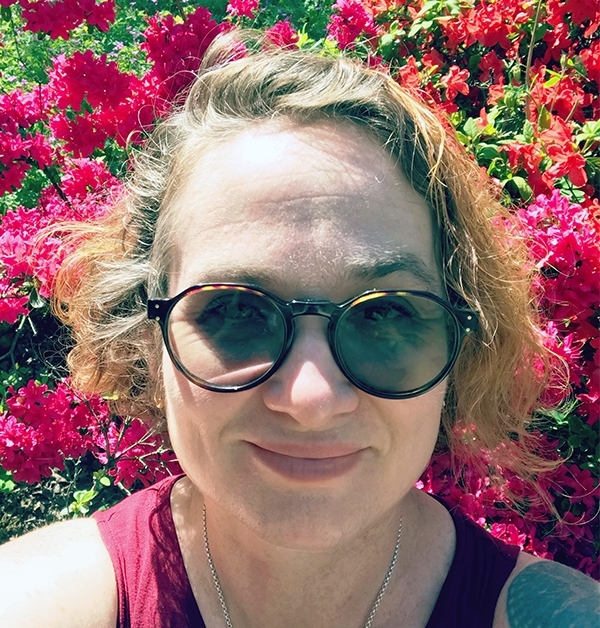
This week on Neurodiversity News, we have interviewed another amazing ally of the neurodiversity movement, who is Shannon Des Roches Rosa. She is a mother of an autistic son and the senior and managing editor of the Thinking Person’s Guide to Autism.
Neurodiversity News: Tell me about yourself and what you do.
Shannon Rosa: I’m the parent of one young adult and two teens, one of whom is autistic. I’m also the senior and managing editor of the Thinking Person’s Guide to Autism (TPGA) website, book, and social media communities, alongside my colleagues, Carol Greenburg and Jennifer Byde
Myers. While TPGA is a neurodivergent editorial crew—some of us are autistic, some are really not, and some are stuck in an uncanny neurodiversity valley—all three of our teen sons are high-support autistic guys, in very different ways.
My defining characteristic is probably needing time alone to recharge, and ideally to read. This has been my tendency since I was a child, when friends who came over to play invariably ended up complaining to my mother that my nose was in a book rather than pointed towards them.
However, as the world is not yet a place that welcomes or usually even pretends to accommodates autistic people like my son—who is one of the greatest human beings you will ever meet—I have become an advocate to help him fight for his rights. TPGA is one of the results of that advocacy.
I also write about autism, parenting, and neurodiversity for outlets like The Washington Post and Spectrum. I’ve been writing publicly since 2003.
NN: In what way have parents, carers, and autistic people themselves benefitted from the TPGA?
SR: The world in general is shifting towards greater autism understanding and acceptance, and I hope TPGA plays a small part in that. I also hope the people you’ve mentioned in the TPGA community have found some of our hundreds of website articles and social media posts useful, as that’s our Island of Sodor-esque goal.
I think the most beneficial thing about TPGA is that community, and that we are always learning from and guiding each other. Our large Facebook community hosts frequent spirited discussions, and while we editors might start the discussions, the community makes them happen. And we frequently host “community queries” from members seeking advice on specific subjects, often bringing up topics I wouldn’t even know to ask about as autistic experiences are so varied.
We also try to help our non-autistic community members understand autistic people as fellow humans with rights and personalities, who have a neurological developmental disability that leads to perceiving and experiencing the world uniquely—but not wrongly. Some new members have never before encountered non-deficit-based affirmations about what their autistic children, students, clients, or even selves need and deserve, and we try to guide folks through their
mind shifts as best we can.
Not everyone is ready, willing, or able to hear the neurodiversity-informed autism information we share. Some people can’t or won’t shake mainstream society’s negative assumptions or stigma about disability, even when happiness and wellbeing is both at stake and within reach. We just keep sharing the information anyhow, knowing that for some it will get through eventually. In the meantime, we know that others are not just listening, but boosting.
One of my favorite community events of the past few years has been the AutINSAR discussions during INSAR, the International Meeting for Autism Research, in which autistic people and/or researchers and other community members get together virtually on Twitter to discuss how
autism research can better serve autistic people. If you want a stark reality check on what autistic people need versus what the world thinks autistic people need, see our AutINSAR archives. INSAR didn’t happen in 2020 because of the COVID-19 pandemic, but we are cautiously
hopeful that it will happen in 2021.
NN: Could you tell me a little about your transition from being an autism
warrior parent to being a neurodiversity supporter?
SR: One of the reasons I co-founded TPGA is to help other parents leapfrog over all the bad information and advice I absorbed when my son was first diagnosed in 2003. For me, going from wanting to cure my son’s autistic neurology to wanting to embrace it was a long, slow, gradual, butting-my-head-against-the-wall process, and it took years. My son deserved better. Other people’s autistic kids deserve better. I’m not proud of the way I used to think about autism, but at least I can use my experience to tell other people about avoidable mistakes.
Because I spent so long learning, and because I am painfully aware that I don’t even KNOW how much I don’t know, I try to be gentle with people who come at me or TPGA from a place of genuine ignorance. It’s not always easy for our new community members to process how most mainstream autism approaches and advice are not only misguided but in some cases harmful, like Applied Behavioral Analysis.
So I try to be supportive while the process of learning makes people’s heads spin, but I also have no problem actively countering willfully ignorant types—anti-vax truthers, pro-institution parents, filicide apologists, Aspie supremacists, pseudoscience floggers, and their ilk—whose actions taint autistic lives. I don’t like confrontation, it is the furthest thing from hiding with my book, but I also know from personal experience how bad autism misinformation warps people’s minds and hurts autistic people. Not on my watch.
Mostly, I am indebted to extremely patient autistic mentors. They took, and in many cases continue, to take the time to nudge me, gently or sharply, towards a better understanding of what my son needs from me as both a parent and an advocate. They also guide TPGA to better serve the autistic community in creating a more autism-friendly world, including helping me understand both how a parent advocate can contribute, as well as when my presence distracts from the autistic voices that should be centered.
NN: Who are your greatest inspirations?
SR: My family and friends, including my son of course. I can’t believe my good fortune in being connected with so many truly wonderful and frequently badass people. Without them, I am nothing.
NN: What do you hope to achieve in the future for you and your son?
SR: All I want for my son is to be happy and feel safe. That’s it. If my kids are happy, I’m happy. Everything I do is toward that goal.
But I also can’t ignore how many other autistic people’s lives are not yet fulfilled, accommodated, or autonomous. That is why I do my advocacy through a public lens, and at TPGA. I try to bring the autism resources and information I learn about while supporting my son to as many other families, professionals, and autistic people as possible. It just feels wrong to operate any other way. And I’m not saying I’m a good advocate, or even an effective one. I’m saying I’m trying. Thankfully, there are so many other disability orgs and advocates out there doing work that undeniably advances autistic rights and quality of life—like the Autistic Self Advocacy Network.
Personally, I would love to see TPGA’s resources both translated into other languages and made culturally attuned, as the lack of autism acceptance and understanding is a global issue. But first we need to finish the second edition of our book–we’ve been working on it for three years, and the current draft is more than 900 pages! It will happen.

KEEP UP THE GREAT WORK, SHANNON ! You truly are a great advocate for Leo and so many other families who need the information, support and cheerleading for autistic people everywhere…….